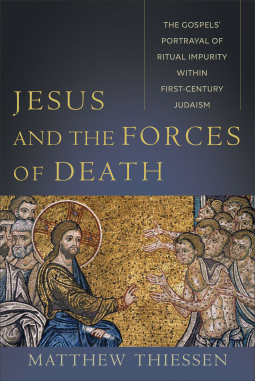
Jesus and the Forces of Death
The Gospels' Portrayal of Ritual Impurity within First-Century Judaism
by Matthew Thiessen
This title was previously available on NetGalley and is now archived.
Send NetGalley books directly to your Kindle or Kindle app
1
To read on a Kindle or Kindle app, please add kindle@netgalley.com as an approved email address to receive files in your Amazon account. Click here for step-by-step instructions.
2
Also find your Kindle email address within your Amazon account, and enter it here.
Pub Date 30 Jun 2020 | Archive Date 28 Feb 2021
Baker Academic & Brazos Press | Baker Academic
Talking about this book? Use #JesusandtheForcesofDeath #NetGalley. More hashtag tips!
Description
Advance Praise
“Thiessen’s masterful study puts to rest the pervasive and false view that Jesus—as portrayed in the canonical Gospels—opposed the ancient Jewish purity laws. Thiessen argues convincingly that the Gospels depict Jesus not as dismantling the Jewish purity system but as destroying the forces of death that result in ritual impurity. The book is compelling and wonderfully written—a must-read for anyone interested in Jesus, the Gospels, and the ins and outs of ancient Jewish law and practice. It also makes a powerful case for the ongoing relevance of the Hebrew Bible for a historical understanding of Christianity and for Christians today.”—Adele Reinhartz, University of Ottawa
“Matthew Thiessen’s Jesus and the Forces of Death is a much-needed historical and theological intervention. For far too long, constricted ideas and damaging misinterpretations of first-century Judaism and Jesus’s ministry have severely limited interpretation of the Gospels. From scholars to students, preachers to everyday Christians, readers will encounter a Jesus here who is far more faithful to his context and thus far more life-giving in his teaching and healing alike.”—Eric D. Barreto, Princeton Theological Seminary
“For centuries interpreters of the Gospels have mistakenly thought that Jesus battled the Jewish ritual purity system, when, in fact, he battled ritual impurity itself. For Jesus and the Evangelists, as for most ancient people, ritual impurity was a real substance, a miasma. And according to the Gospel accounts, Jesus came to destroy it—so argues Matthew Thiessen in this brilliant book. If you read this book, you will learn a thousand new things.”—Matthew V. Novenson, senior lecturer in New Testament and Christian origins, University of Edinburgh
“Matthew Thiessen has written a thought-provoking and in-depth study on the Gospels’ depiction of Jesus’s work in relation to purity laws. Importantly, he demonstrates that the authors portray Jesus as acting wholly in accordance with Jewish laws. Thiessen’s innovative interpretation of the Gospel stories is a welcome addition to the scholarship on purity in the New Testament. This study is sure to generate much discussion and debate.”—Cecilia Wassén, associate professor in the department of theology, Uppsala University
“In Jesus and the Forces of Death Matthew Thiessen brilliantly brings the Jewish purity regulations to bear on the Gospel narratives. Thiessen’s careful navigation of the distinctions between the sacred and the pure, as well as the morally and ritually impure, are worth the price of the book, but his greatest achievement is perhaps the convincing and fresh exegesis of the Gospels that his perspective yields. Challenging the proposals of previous scholars, Thiessen shows that the Gospel authors did not relax the purity requirements but rather insisted that in Jesus, the God of Israel had released a ‘powerfully contagious force of holiness.’ Never before have blood, skin conditions, and death been more important for understanding how the Gospels portray Jesus of Nazareth!”—Chris Keith, research professor of New Testament and early Christianity, director of the Centre for the Social-Scientific Study of the Bible, St. Mary’s University, Twickenham
“Demonstrating his knowledge of and regard for Jesus’s Jewish context, Thiessen convincingly discards the problematic claim that Jesus rejected or opposed the Jewish ritual purity system. What emerges from his study is a Jesus whose superior holiness purifies and removes the sources of ritual and moral impurity. Jesus introduces the powerful holiness of God into the world, thereby overcoming every source of impurity and death. Thiessen’s argument is clear, elegant, and profound. A wonderful contribution to the recovery of Jesus’s Jewish heritage!”—Joshua W. Jipp, associate professor of New Testament, Trinity Evangelical Divinity School
Available Editions
| EDITION | Other Format |
| ISBN | 9781540961945 |
| PRICE | US$39.99 (USD) |
| PAGES | 256 |
Featured Reviews
As a pastor, I found this book extremely helpful as I seek to help make the Gospels come alive for my parishioners. This book helps unpack the ritual stuff that lives behind the scenes in a majority of the Gospels, shedding new light on our understanding of a wide variety of well known scriptural passages. This book can help inform sermons but would also help guide meaningful Bible study on the topic of what the understanding of impurity in the ancient world means for our life today.



